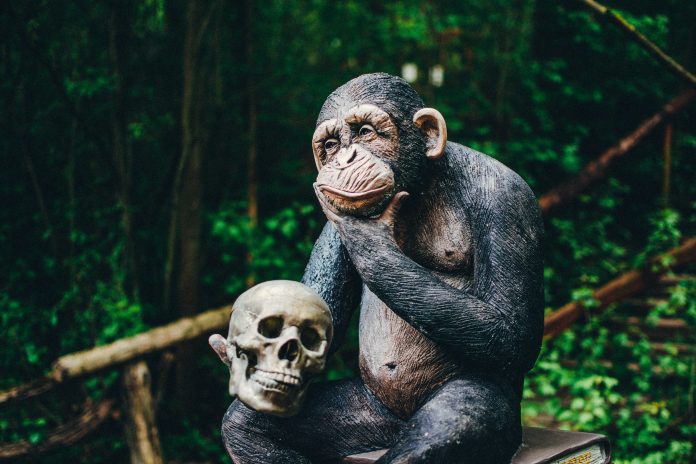In the vast tapestry of ideas about human evolution, few are as tantalising and controversial as the ‘Stoned Ape Theory.’
Proposed by the British ethnobotanist Terence McKenna in the 1990s, this hypothesis suggests that the consumption of hallucinogenic mushrooms may have played a pivotal role in the development of early human cognition.
But how solid is the ground upon which this theory stands, and can mushrooms really be credited for our unique evolutionary trajectory?
What is the Stoned Ape Theory?
At its core, the Stoned Ape Theory posits that our hominid ancestors, upon descending from the trees and starting to explore the vast African grasslands, came across the naturally occurring psychedelic substance – psilocybin mushrooms.
Consuming these mushrooms, the theory suggests, could have catalysed an array of evolutionary benefits: enhanced vision, promotion of sexual activity, inducing a sense of community through ritualistic behaviours, and most controversially, the rapid expansion of the human brain.
McKenna speculated that, in low doses, psilocybin could have sharpened visual acuity, making it easier for early humans to hunt.
In moderate doses, it might have fostered bonding and group cohesion, which are paramount in the tribal dynamics of our species.
In higher doses, the transcendental experiences could have laid the groundwork for spirituality, art, and philosophical pondering.
Evidence in favour of the Stoned Ape Theory
- Neural Connectivity: Modern studies using MRI scans have shown that psychedelics like psilocybin lead to increased connectivity between different regions of the brain. These novel connections might enable a form of thinking that’s more fluid, imaginative, and creative – potentially explaining the birth of art and religion.
- Evolutionary Timeline: The timeline proposed by
McKenna aligns with certain significant leaps in human evolution. Around the same time our ancestors might have encountered these mushrooms, there was a noticeable and still-unexplained doubling of the human brain size.
- Ubiquity of Psychedelic Rituals: Many indigenous cultures around the world have deep-rooted traditions of consuming psychedelic substances in ritualistic settings. This universality hints at an ancient relationship between humans and hallucinogenic compounds.
Arguments against the
- Lack of Direct Evidence: Despite the intriguing timeline alignment and potential benefits, there is no direct archaeological evidence linking early human consumption of psilocybin mushrooms to cognitive advancements. Many of the speculated benefits remain just that – speculation.
- Brain Expansion Factors: Several other factors could account for the rapid expansion of the human brain, such as dietary changes (like the inclusion of fatty acids from fish), social structures, and environmental challenges. Pinning it on a single factor, such as mushroom consumption, seems overly simplistic.
- Other Cultures Without Psychedelics: While many indigenous cultures do have traditions surrounding psychedelics, there are numerous advanced societies with no historical use of hallucinogenic substances. Their absence in some cultures’ development suggests that while they might be beneficial, they aren’t a necessary ingredient for cognitive or societal evolution.
In the realm of scientific exploration, the Stoned Ape Theory remains on the fringes. While it’s an enchanting idea that melds together anthropology, botany, and spirituality, it lacks the robust empirical evidence needed to gain widespread acceptance.
However, it’s worth noting that as research into psychedelics grows, especially in the realms of medicine and psychology, we are continually uncovering more about these substances and their profound effects on the human brain. Who knows? Perhaps in the future, we might stumble upon new discoveries that shed more light on this audacious theory.
For now, the Stoned Ape Theory remains a captivating narrative of human evolution, asking us to look at our history through a different, if slightly psychedelic, lens.
Whether it holds the key to our cognitive leap or is merely a fascinating detour in the story of humankind, it’s a testament to the boundless curiosity of the human spirit.


